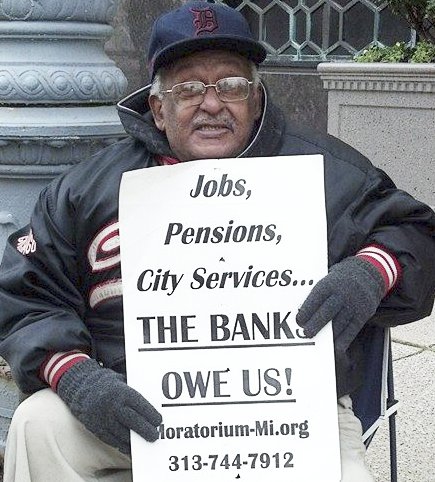

A public meeting in Detroit Sept. 22 demanded that federal Helping Hardest Hit Funds be used to stop tax foreclosures related to evictions and water shutoffs.
The meeting was organized by City Councilwoman Mary Sheffield and co- hosted by the Moratorium Now! Coalition to Stop Foreclosures, Evictions and Utility Shutoffs; the United Community Housing Coalition; and Michigan Legal Services.
One of every three homes in Detroit has been foreclosed in the last 10 years. That’s since the beginning of the housing crisis brought on by the racist, fraudulent lending practices of the major banks.
In addition, 65,000 homes have had water shut off since 2014. At that time the Detroit Water and Sewerage Department (DWSD) began targeting homes for disconnection where owners are behind at least $150 on their bills.
In October, thousands more families will face eviction when their homes are auctioned off to complete foreclosures for failure to pay property taxes. Some 14,000 families have had their water shut off since April of this year, with 11,000 more on the list scheduled for termination.
This total omits the tens of thousands of families who have been placed in property tax or water payment plans. If these families miss just one payment, they will face the loss of their homes. And, truth be told, they can’t afford these payments.
The funds are there
As organizers pointed out, funds are available to stop these evictions and water shutoffs. That would at least halt the devastation.
Since January of this year, the federal government has given the state of Michigan an additional $260 million in Hardest Hit funding. These funds — the people’s tiny share of money allocated in the Trade Recovery Adjustment Act, which bailed out the banks and auto companies to the tune of hundreds of billions of dollars — were earmarked to aid families and communities especially affected by the housing crisis.
In an anti-people decision, the Michigan State Housing Development Authority, which administers Michigan’s Hardest Hit program, has allocated 80 percent of the funds to tear down homes, rather than keep families in them with running water.
In Detroit, the funds are being turned over to the Detroit Land Bank and Blight Task Force headed by subprime lender Dan Gilbert. While they give these entities the funds, at the same time the feds are investigating the Land Bank for criminal fraud and cronyism in its administration of the “blight removal” program.
At the meeting on Sept. 22, organizers demanded that the Hardest Hit Funds be used to pay overdue property tax and water bills. That would keep families in their homes. They also want the county treasurer and DWSD/Great Lakes Authority to place an immediate moratorium on foreclosure-related evictions and water shutoffs while the funds are reallocated.
Two tireless housing advocates, Marilyn Mullane from Michigan Legal Services, and Ted Phillips of the United Community Housing Coalition, exposed how MSHDA has made the Hardest Hit Funds virtually inaccessible to the poor. They exposed bureaucratic impediments to access and demanded that regulations be rewritten to maximize their effectiveness.
Monica Patrick, of We the People of Detroit, joined the rally to express the urgency of tying together the fight to stop water shutoffs with evictions caused by foreclosures. She showed slides reflecting how neighborhoods throughout Detroit are being devastated by this joint scourge.
Linda Jourdan, of the American Civil Liberties Union, described the legal organization’s lawsuit. It exposes how tax foreclosures in Detroit are based on illegal assessments that overinflate the value of homes throughout the city and how thousands of Detroiters have been denied poverty exemptions to which they are entitled.
Jerry Goldberg, of the Moratorium Now! Coalition, thanked Councilwoman Sheffield, calling her the first government official to take up this fight. Goldberg noted that if Hardest Hit Funds were used for their intended purpose, it would actually put money into government coffers that could be used for blight removal and infrastructure.
Goldberg emphasized the role of the banks in destroying Detroit’s neighborhoods and demanded that the banks be made to pay to remove and remediate the blight they caused.
A demonstration has been called for Wednesday, Oct. 5, to press the demand for a moratorium on foreclosures/evictions and water shutoffs and for freeing Hardest Hit Funds to keep families in their homes. The protest will be held at the Wayne County Treasurer’s Office, 400 Monroe in Detroit, at 12 noon.
For more information, call 313-680-5508 or visit moratorium-mi.org.
Download the PDF May Day appeal to the working class Revolutionary change is urgent! Gaza…
Philadelphia On March 26, the Pennsylvania Supreme Court denied political prisoner Mumia Abu-Jamal permission to…
There are two important and overlapping holidays on April 22: Earth Day and Vladimir Lenin’s…
Twelve people were arrested April 9 for blocking traffic to Travis Air Force Base, a…
Secretary-General of Hezbollah Sheikh Naim Qassem delivered a speech on April 18, 2025. Resistance News…
Anakbayan Philadelphia held a rally on April 19 to demand the U.S. end its military…